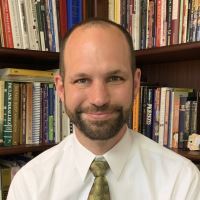Commentary on Isaiah 35:1-10
One of the great pleasures of proclaiming God’s words from the book of Isaiah is selecting from the multitude of meanings the text supports. This week, as we continue to celebrate Advent and look forward to the birth and re-birth of God’s hope for the world, we are spoiled for choice with interpretive possibilities due to the polyvalence of Isaiah 35.
First, is this chapter a preview of the return of exiles to Babylon? We can certainly read it that way. Does God speak to exiles of Jerusalem, urging them to bodily strength (Isaiah 35:3-6) for the journey back to Jerusalem (Isaiah 35:10) on God’s holy highway (Isaiah 35:8)? This interpretation is intimately connected with a similar post-exilic reading of Isaiah 40 and after. God is speaking to those who have been displaced by divine punishment of injustice and idolatry, promising restoration and return—both of God’s favor and the exiles themselves. The hope for exiles becomes a Second Exodus in which God once again leads the Holy Community through wastelands to re-inhabit the promised land.
Or is this a vision of ecological restoration? We can certainly read it that way. The wilderness and desert will blossom abundantly (Isaiah 35:2). Indeed, the character of the wilderness will be wholly changed to resemble Lebanon, with its famous forests; Mount Carmel, associated with rainfall, forests and wildflowers; and the Plain of Sharon, one of the most fertile areas in the Holy Land. Isaiah speaks of abundant water welling up in the formerly desert places (Isaiah 35:6-7) that leads to changes first in flora and then in fauna. As grasses and plants grow, no longer will jackals and lions stalk the barren landscape (Isaiah 35:7, 9). Does the prophet look forward to a time of ecological change, when desert landscapes and ecosystems will be rearranged to make a new garden in which God and humans will dwell together?
Or is Isaiah 35 simply a good, ole prophesy of national vengeance? We can certainly read it that way, as Rashi, the 11th century French sage, does. The wilderness and desert are not to be thought of as geographical areas, but as other names for Jerusalem and Zion. Certainly, throughout Isaiah, Jerusalem, a relatively well-watered mountain town, has been threatened with wilderness and desert conditions, and promised reprieve from desertification as well (Isaiah 5:6, 51:3, 64:10). In Rashi’s reading strategy, wilderness restoration becomes a sort of code for reversing political and military subjugation of Jerusalem.
Driving this interpretation, Rashi notes that the first word of chapter 35 is a sort of Hebrew contraction. Because yesusu is an intransitive verb, it does not have a direct object, and the mem, therefore, must represent an indirect object. Thus, yesusum should be read as yesusu mehem (“shall rejoice from them”). Rashi references similar cases of Jeremiah 10:20 “My children have gone away from me (yitzani),” and I Kings 19:21 “He boiled the meat for them (beshalam).” The wilderness and desert are not just rejoicing in a vacuum but rejoicing over or against something. The rest of the chapter becomes a sort of celebration of God’s vengeance against those who have overpowered Jerusalem.
If chapter 35 opens with a restored Jerusalem rejoicing over national enemies, many of the details of the following verses can be read in support of this interpretation. Just as in former times the trees of Lebanon were cut down to build the temple and Solomon’s palace, so, again, will the areas north of Jerusalem be despoiled to build up Jerusalem. When God shows up, it is with vengeance and with retribution deserved by those who have harmed Jerusalem, however God will save the Holy Community (Isaiah 35:4).
In this reading, the opening of the eyes of the blind, the unstopping of the ears of the deaf and the enlivening of the limbs of the disabled are not miraculous healings. Instead, God will confront those who have made themselves blind to injustice with searing visions. Those who made themselves deaf to the cries of God’s poor and marginalized will be unable to shut out their cries. And those who lounged in luxury will run away in fear from their palaces like a frightened deer. All this will cause the mouth that has been shut up for fear of further persecution to sing for joy. God will make a road that the unclean, the foolish and the powerful (represented by lions) will be unable to trod upon (Isaiah 35:8-9). This is a highway of exclusion, made to show that all those who humiliated Jerusalem and her people will be thrust aside. The returnees will celebrate, and those who persecuted them will flee with sadness and sighing (Isaiah 35:10).
This lectionary reading, and much of the rest of Isaiah, offers the preacher the opportunity to do the work of exegeting the congregation while you exegete the text. What do your people need to hear? Is the Second Exodus a word of hope—that God is a god of repetitive salvation. When the People become enslaved—whether to Egypt, Babylon, or sin and death—God will liberate them. Or, in this time of climate change and ecological devastation, do your people need to hear that God longs to undo desertification and make the burnt wastelands fertile once again? Or do your people need to hear what Jesus and the prophets so often proclaimed: that might does not make right, and that those who abuse others will meet an inescapable judgment at the hands of the God who sees?
Advent is a rich time, fecund with meaning. The words of Isaiah are rich, and we have abundant traditions of powerful interpretations of those words. As always, when we set ourselves the task of interpreting and proclaiming God’s words for the people, I think it is important to be honest with ourselves and our people that there is no one, inherent meaning of the text. What a gift!


December 11, 2022